Dal Tadka is a popular Indian lentil dish made with arhar dal (husked & split pigeon pea lentils) or masoor dal (husked & split red lentils). This Dal Tadka recipe gives you a delicious creamy dal with smoked flavors.
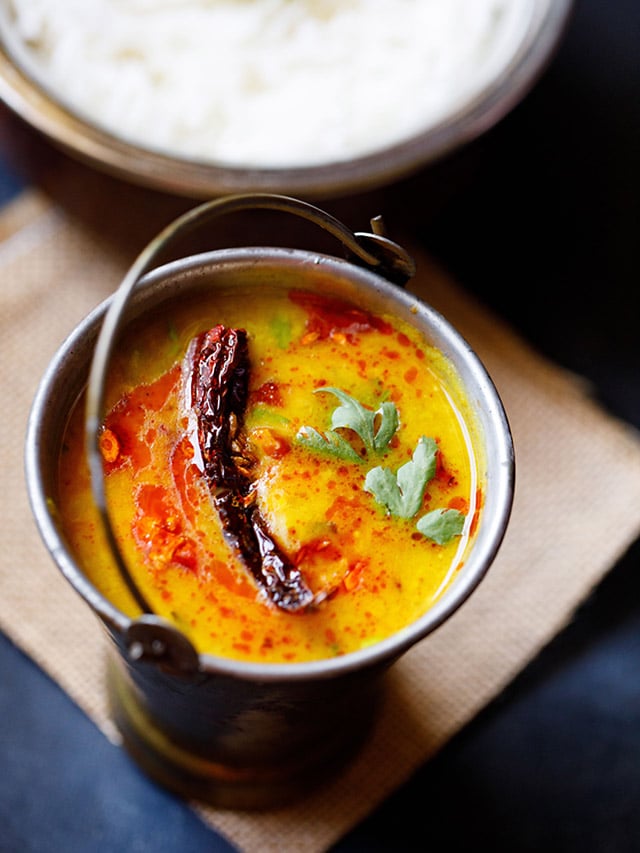
In this post I am sharing 2 versions of the recipe.
- Restaurant Style Dal Tadka – Made on Stovetop with an optional smoking method.
- Home Style Dal Tadka – Made in the Instant Pot.
Both the recipes are easy and taste good. You can make either of them as per your preference. For making homestyle dal tadka on stovetop, check the notes section in the recipe card of instant pot dal tadka recipe.
About this Recipe
Dal Tadka is one of the most popular lentil dish served in Indian restaurants. Basically, dal tadka is cooked lentils which are tempered with oil or ghee fried spices & herbs.
I have to admit that I simply love the dal tadka that is served at the restaurants even though we hardly eat out.
So I try to recreate the restaurant magic in most of the food that I make at home. Here the restaurant style flavors come from smoking the dal using a red-hot charcoal.
Trust me, this simple method of smoking makes the dal so much flavorful and tasty. In Hindi language we also call this smoking technique as dhungar.
This Dal Tadka recipe is more of a North Indian style recipe.
What does Dal Tadka mean?
- Dal is the Hindi term for lentils.
- Tadka or Chaunk is the Hindi term for tempering and is a commonly employed cooking technique in the Indian cuisine.
- Tempering method has the spices & herbs fried in oil. The frying of the spices and herbs release their essential oils, aroma and flavor in the hot oil. This fried spices, herbs, oil mixture is added to prepared lentils or cooked rice or steamed vegetables and it greatly changes the flavor, aroma and taste of the dish. Tempering is very much a part of cooking Indian food and we use this method while making dal, vegetable dishes or chutneys.
Lentils added
- Tuvar dal – Generally dal tadka is made with tuvar dal or arhar dal also known as split pigeon pea lentils. In this post, I have shared the dal recipe made with tuvar dal.
- Moong dal – Even moong lentils can be used to make the recipe. At times I make this recipe both with tuvar dal and moong dal. The recipe can also be made with a mix of masoor dal (red lentils) and pigeon pea lentils. If you want to use moong dal then you can refer this post – Moong Dal Tadka.
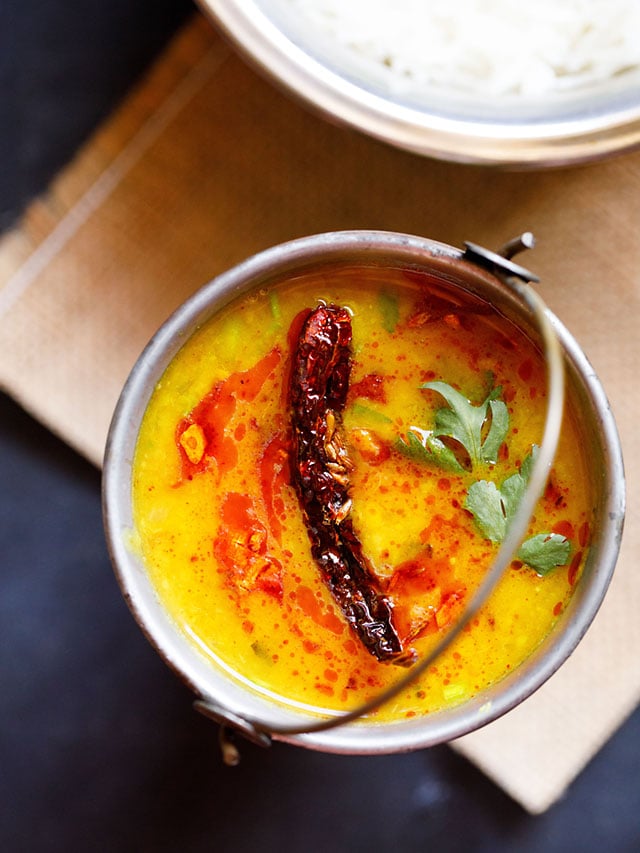
How to make Dal Tadka
1. Rinse 1 cup tuvar dal or arhar dal (split & husked pigeon pea lentils) for a couple of times in water. Add them to a 3 litre pressure cooker.
You can also cook the lentils in a pot. Soak the lentils for an hour or two before you cook them in a pot. The method on cooking lentils in a pot is mentioned in the notes section of the recipe card below.
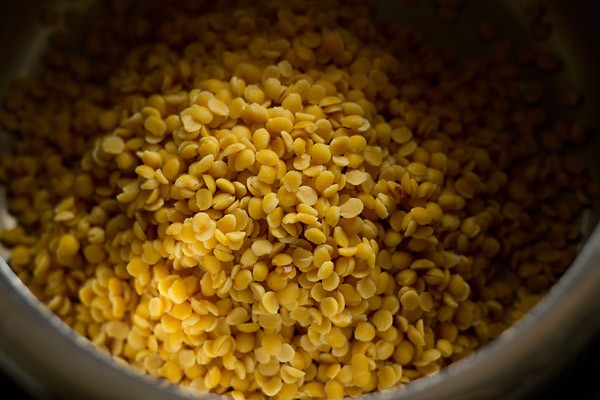
2. Add ½ cup chopped onions, 1 cup finely chopped tomatoes, 1 or 2 green chilies (1 teaspoon of chopped Anaheim pepper or Serrano pepper can be subbed for green chillies) and 1 teaspoon finely chopped ginger.
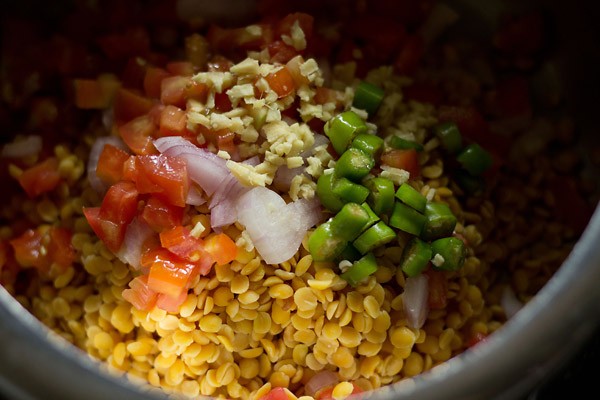
3. Pour 2.5 cups of water. If cooking in a pot, then about 4 to 4.5 cups of water can be added.
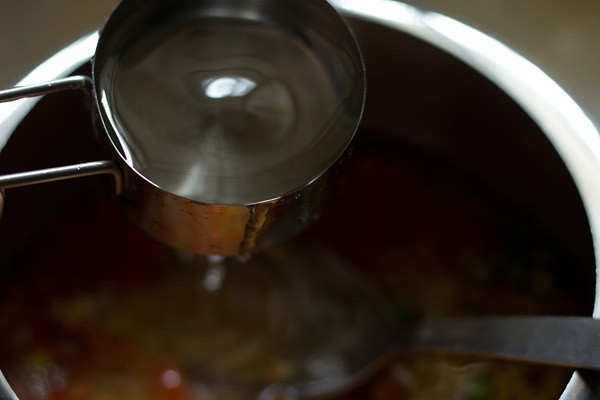
4. Add ½ turmeric powder and 1 pinch of asafoetida (hing). If you do not have asafoetida, then skip it.
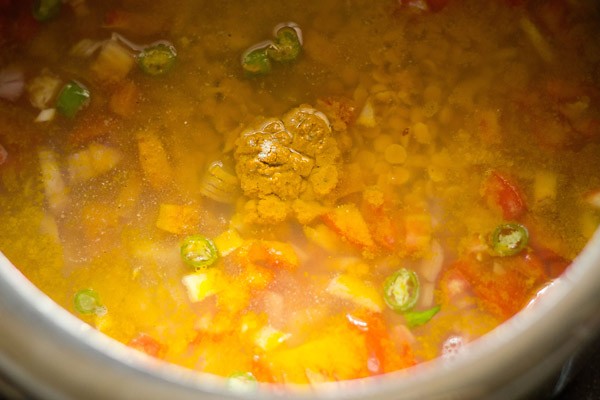
5. Mix well.
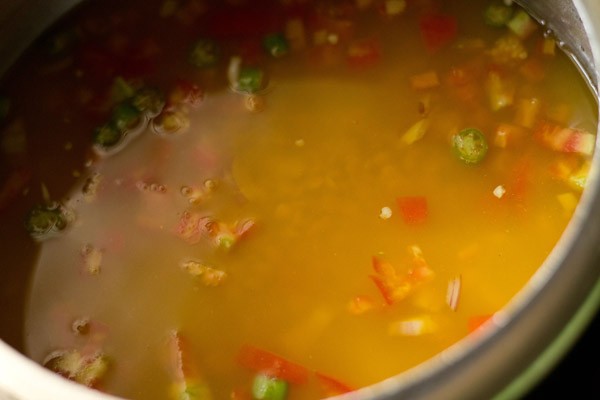
6. Pressure cook the lentils for about 7 to 8 whistles or more till they become soft and creamy. Mash the cooked lentils with a wired whisk or with a spoon and keep aside.
If the consistency looks thick, then add some water. About ½ cup to 1 cup water (depending on the thickness) to get a medium consistency. Simmer dal for 3 to 4 minutes. Consistency of the lentils in the below photo.
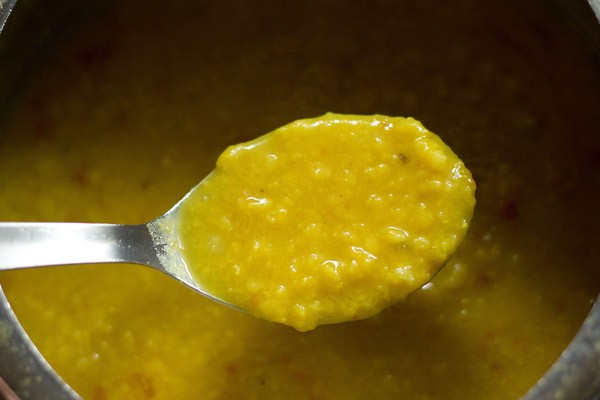
7. Once the desired consistency is reached, add 1 to 2 tablespoons low-fat cream (optional), ½ teaspoon garam masala powder, 2 tablespoons chopped coriander leaves (cilantro) and salt as per paste. Switch off the the heat.
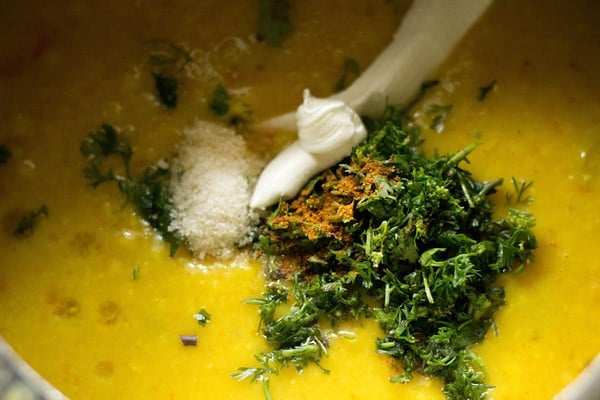
8. Mix well so that everything combines uniformly. Check the salt before you add the tempering. If the salt is less than add more salt to the dal.
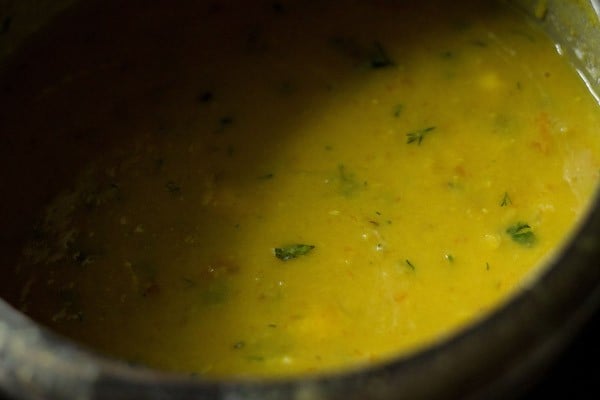
9. The final consistency of the cooked dal.
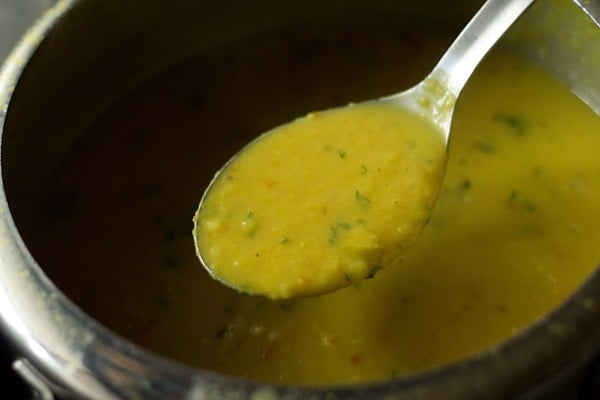
Optional – smoking or dhungar method
10. Next is the dhungar method of flavoring dal tadka with the smoky fumes of burnt charcoal. For this with the help of tongs or on a grill pan like shown in the photo below, place a small piece of charcoal.
Burn the charcoal till it becomes red hot. Please use natural charcoal for this method. Note that this is an optional step and you can proceed directly to the tempering method.
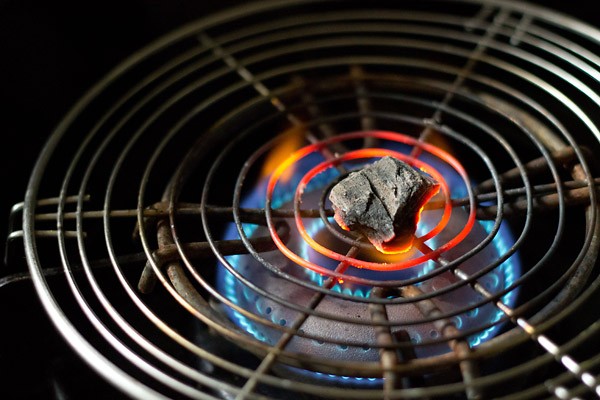
11. Place the red hot charcoal in a small steel bowl. You can also use onion layers or a halved hollow onion for the same.
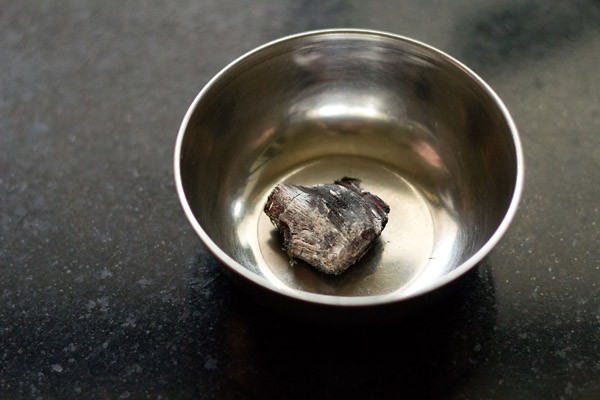
12. Pour about ¼ tsp of oil or ghee on the charcoal. You will see fumes emanating as soon as you pour oil or ghee on the hot charcoal.
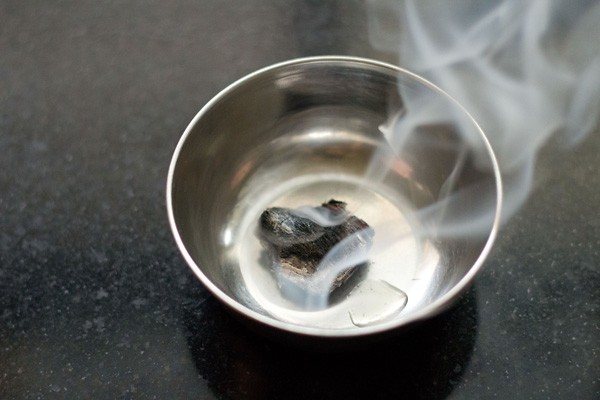
13. Place this bowl on the dal.
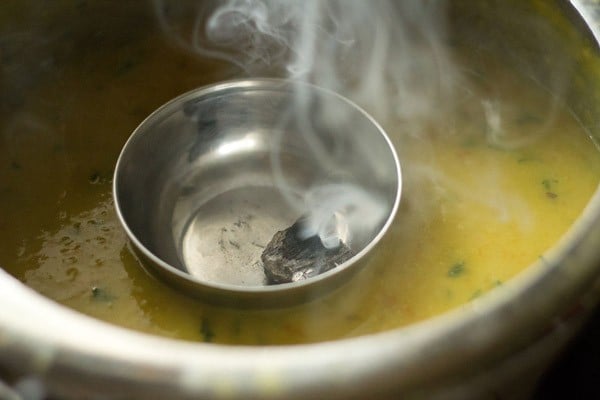
14. Cover the cooker or the pot with a lid and let the dal get infused with the charcoal smoke. Just keep for 1 to 2 minutes.
Do not keep for a long time as then the dal can taste bitter. Remove the bowl carefully with the help of tongs and cover the cooker with a lid. Set aside.
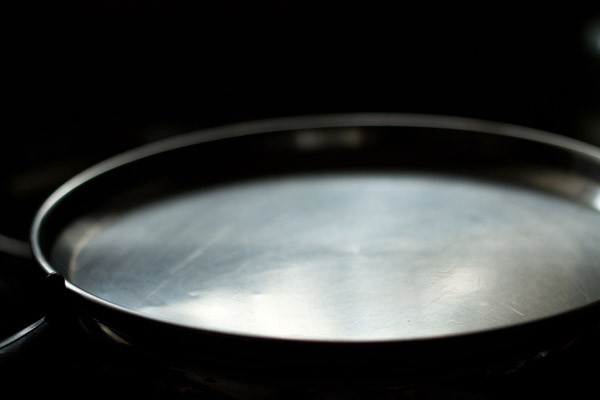
Making tempering or tadka
15. Next heat 3 tablespoons oil or ghee (clarified butter) in a small pan. First, add 1 teaspoon cumin seeds and crackle them. The cumin should get fried and not be raw, but don’t burn them.
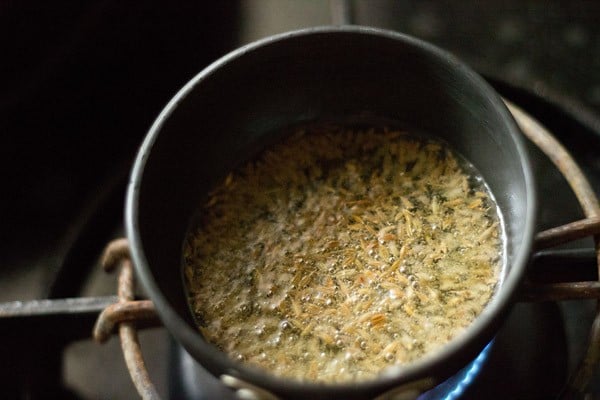
16. Now add 2 to 3 dry red chilies, a generous pinch of asafoetida and 5 to 6 medium sized garlic cloves which have been finely chopped. Let the garlic brown and the red chilies change color. Do not burn the garlic.
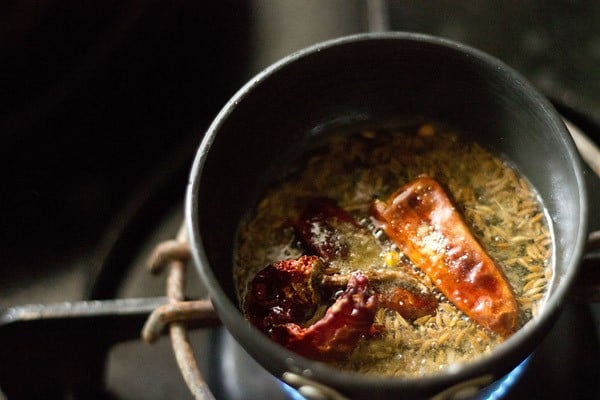
17. Lastly add 1 teaspoon crushed kasuri methi and ½ teaspoon red chili powder or cayenne pepper. Mix and switch off the stove. Make sure to fry the tempering ingredients at a low flame, so that you don’t burn them.
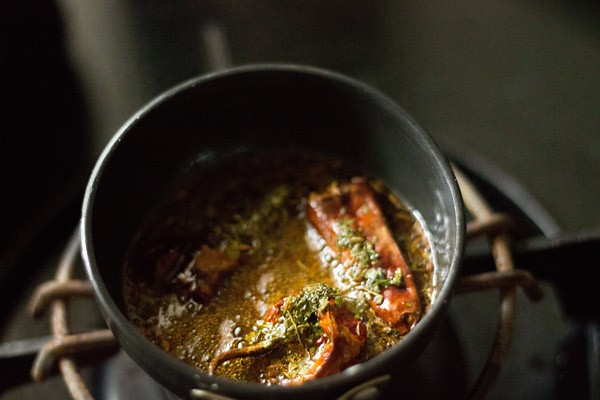
18. Pour entire tempering along with the oil or ghee into the dal.
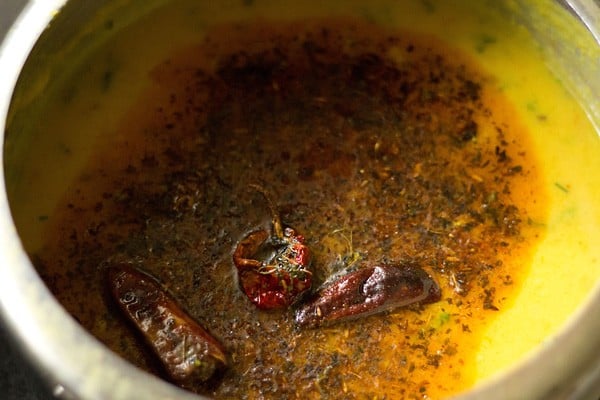
19. You can mix the dal with tempering or serve the dal tadka with the tempering on top it. Garnish with coriander leaves. Serve it hot with steamed basmati rice, cumin rice or with Indian flatbread like roti or paratha or chapati or naan.
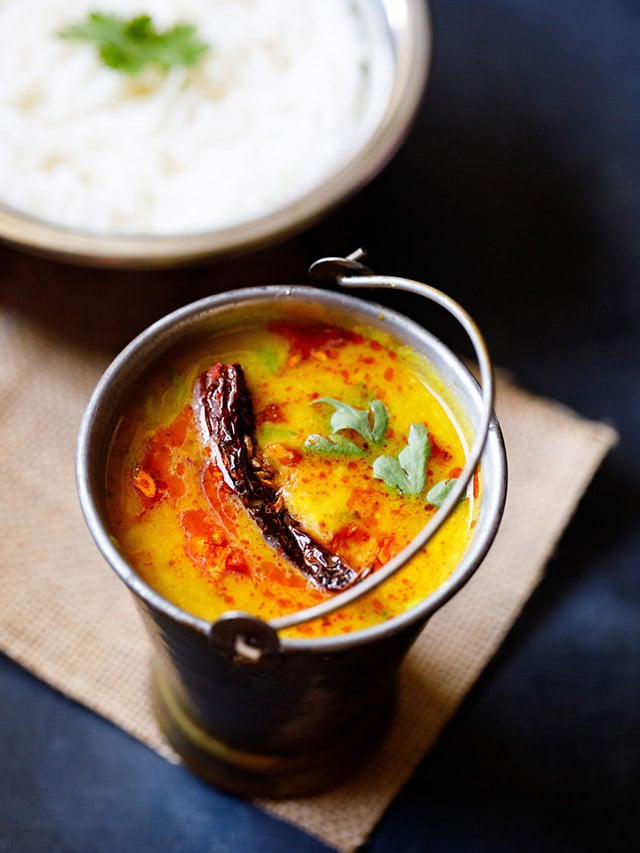
No comments:
Post a Comment